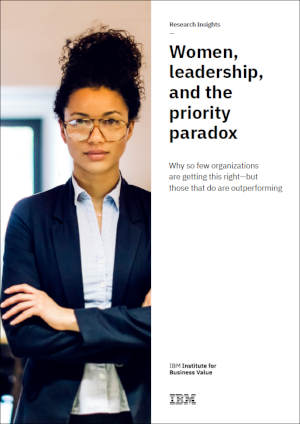Ungated Post | 01 Mar 2019
Women, leadership, and the priority paradox

While women may be in fewer leadership positions worldwide, those organizations with more females at the top outperform their peers.
Oxford Economics worked with IBM’s Institute for Business Value IBV to survey 2,300 executives and professionals – an equal number of women and men – from organizations worldwide across multiple industries to better understand why the gender gap in leadership persists and what can be done to ignite real change.
Respondents included individual C-suite officers (CEOs, CIOs, CFOs, CMOs, COOs, CHROs, and others) as well as senior VPs, VPs, directors, middle managers, and nonmanagerial professionals to capture current leaders’ assessments and assessments from those who could be potential future leaders.
The 10 industries represented included banking, consumer products, education, government, healthcare, insurance, manufacturing, retail, technology, and telecommunications. They each comprise 10% of the total sample. The countries/regions in the survey represent a mix of areas where the gender gap ranges from small to large, according to the World Economic Forum’s Global Gender Gap Report (2017). Each country (or region) comprises 11% of the total
sample.
Our Thought Leadership team produces original, evidence-based research made accessible to decision-makers and opinion leaders.
Oxford Economics’ team is expert at applying advanced economic tools that provide valuable insights into today’s most pressing business, financial, and policy issues.
Related Services

Post
Global Trade Education: The role of private philanthropy
Global trade can amplify economic development and poverty alleviation. Capable leaders are required to put in place enabling conditions for trade, but currently these skills are underprovided in developing countries. For philanthropists, investing in trade leadership talent through graduate-level scholarships is an opportunity to make meaningful contributions that can multiply and sustain global economic development.
Find Out More
Post
Mapping the Plastics Value Chain: A framework to understand the socio-economic impacts of a production cap on virgin plastics
The International Council of Chemical Associations (ICCA) commissioned Oxford Economics to undertake a research program to explore the socio-economic and environmental implications of policy interventions that could be used to reduce plastic pollution, with a focus on a global production cap on primary plastic polymers.
Find Out More
Post
The Economic Contribution of Mexico’s Audiovisual Industry
This report demonstrates the integral role that the AV industry plays in Mexico's economy by estimating the industry’s domestic economic footprint. The analysis comprises all aspects of the audiovisual industry, including film production, distribution, and exhibition; the production, distribution, and broadcast of television content on free-to-air and pay TV channels; and online video platforms. Our estimates provide a recent snapshot of the audiovisual industry, including impacts at the broader industry level and broken out by sub-sector.
Find Out More